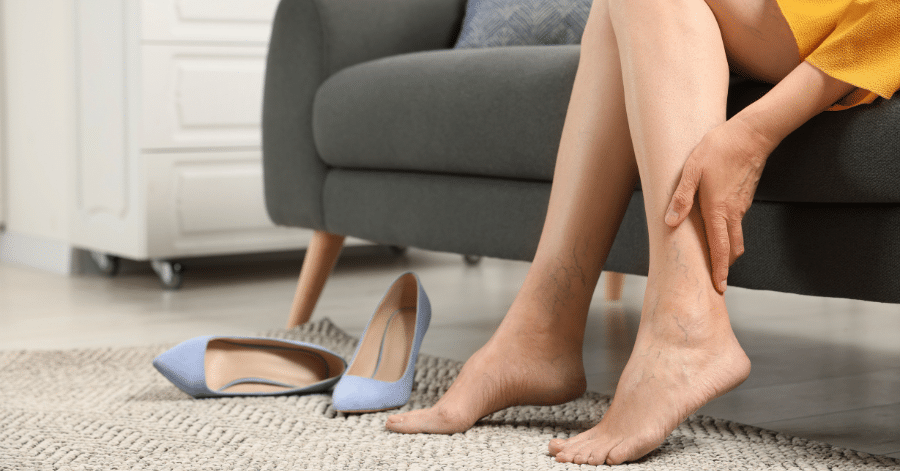Varicose veins are a common problem, and they become a lot more common as we get older. Of course, the most recognizable sign or symptom of varicose veins is their purplish, twisted appearance. But that’s not the only symptom they can cause. Here are three symptoms associated with varicose veins that you may not be aware of.
1. Symptoms of Varicose Veins: Itchy Skin
Itchy skin is one of the most overlooked symptoms of varicose veins, probably because it’s so easy to write off as another problem like dry skin or allergies. So why do varicose veins cause itching? It has to do with a condition called venous stasis, which essentially means “vein inactivity.” Venous stasis occurs when the blood inside a leg vein slows down significantly. With varicose veins, the tiny valves inside your veins stop working the way they’re supposed to.
Normally, those tiny valves open and close repeatedly, keeping your blood flowing back toward your heart. But in varicose veins, the valves malfunction, and blood flow slows down. As blood builds up behind those valves, tiny leaks can develop that allow fluid to seep into the skin, causing irritation and itching.
Without treatment, your skin may become scaly and red, a condition called stasis dermatitis. As itchy as your skin may become, it’s important not to scratch. Scratching irritated varicose veins can cause cuts and sores that take a long time to heal with poor circulation.
2. Symptoms of Varicose Veins: Nighttime Leg Pain
Leg pain and cramps can occur any time of the day with varicose veins. However, they’re often more noticeable at night when you’re lying still and trying to sleep. A leg cramp occurs when the muscle in your leg squeezes — hard. Remember those tiny valves that stop working the way they’re supposed to?
When the circulation in your legs slows down as a result of your varicose veins. Then your leg muscles don’t get the steady supply of oxygen- and nutrient-rich blood they need. Plus, the slower flow of blood lets toxins build up in your tissues. Both these issues combined are what causes the muscles in your legs. Usually, your calves tighten up and have cramps.
The reason cramps are more noticeable at night could be because, during the day, your legs are moving more, and that helps circulation. When you’re lying still, circulation naturally slows down. The additional circulation problems caused by varicose veins can increase the likelihood you’ll experience cramps. Nighttime leg cramps are often worse after you’ve spent a long day on your feet.
3. Symptoms of Varicose Veins: Swollen Legs
Lots of issues can cause swelling in your legs. Including deep vein thrombosis (DVT), and blood clots located in the deeper veins of your legs. With varicose veins, leg swelling typically occurs when blood pools behind your damaged vein valves, increasing the pressure inside your veins. That added pressure can lead to tiny leaks, especially through the smallest blood vessels called capillaries.
That leaked fluid tends to accumulate, resulting in swelling. Less commonly, a superficial clot can form in one of your diseased veins, also contributing to swelling. This type of swelling may also be accompanied by a brownish discoloration in your skin or the affected area may feel warm to the touch.
Don’t Ignore the Symptoms
Varicose veins are never “normal.” They’re always a sign that something’s not quite right with your circulatory system. At our Advanced Vein Center, we have minimally invasive vein stripping treatments. Our vein specialists will evaluate your varicose veins. Even if they aren’t causing any annoying symptoms. They have experience in diagnosing the causes of varicose veins, so they can customize your treatment for your unique needs.
Call us or schedule a teleconsultation to learn about our varicose vein treatments or to have your veins evaluated.










